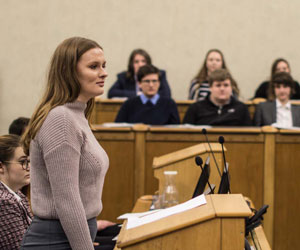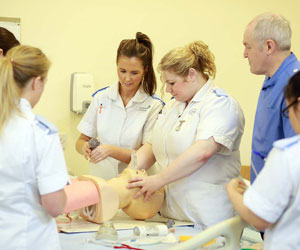The LL.M International Business Law meets the current demand for specialist knowledge and skills in the rapidly expanding fields of international commercial and business law. It provides students with the opportunity to explore, in-depth, the legal regulation of the world of international business. Academically rigorous, the LL.M will expose students to a practical real-world application of the law.
The LL.M is taught by an outstanding team of professional research active staff who have extensive practice and academic experience. The programme aims to enhance knowledge and critical thinking in this area.
The programme provides advanced critical analysis of the key themes and emerging challenges facing businesses, in a global context such as in international/global business environments and innovation and enterprise.
- Competitive tuition fees payable in interest-free monthly instalments
- State of the Art Online proprietary technology
- Practical and innovative curriculum
- Comprehensive access to online legal libraries (LexisNexis and Westlaw)
- International Faculty graduated from some the Top Law Schools
This course is run in partnership with Robert Kennedy College and applications should be made directly at their website.
Graduate destinations
The LLM qualification can help career development in the legal sector (including for those practising law in commercial and business fields) as well as the Business and Management industry, helping promotion to middle and senior management. To meet the constant evolution of global business law development, we offer the opportunity to gain the qualification in one year.
Course outline
Course summary
The programme aims to provide students with a rigorous academic experience whilst also developing innovative methods of delivery, particularly in the use of technology enhanced learning. Much emphasis is placed on ‘deep’ learning whereby learners grasp and apply principles to different contexts and experiences. Skill usage is integrated with subject knowledge, and skill and subject coverage is designed to be incremental. Methods of innovative delivery use pedagogical approaches such as active learning from quizzes and experiments, role play and debates, enquiry-based learning and interactive learning using group discussions and clinical legal education methods.
Students are encouraged to critically reflect critically on their skills development in order to develop their ability to make sound professional judgments. This allows students to actively apply and integrate the theory of law with legal and professional skills.
The overall aims of the programme are:
- To provide an advanced understanding of the corporate and legal responsibilities and governance in an international business context.
- To provide opportunities for the systematic development of the skills of objective analysis, evaluation and presentation to enable students to further develop confidence in effectively appraising and implementing market strategies in the context of international business law.
- To develop an ability to apply knowledge and understanding of business law in relation to complex issues affecting global trade and corporate governance, both systematically and creatively, to improve business and management practice.
- To provide a stimulating academic environment, rooted in the experiences of the student, but firmly based upon the values of academic openness and critical appraisal.
- To explore and develop a comprehensive understanding of academic theory in order to inform and improve current business and commercial and legal practice in an international business context.
- To critically apply ‘action based learning’ in the form of experiential activities and enable students to develop and manage solutions to complex circumstances, whilst analysing the impact this will have on the organisation with an emphasis on the international business context.
Modules
Year one
Compulsory modules
- Advanced Legal Skills
- International Alternative Dispute Resolution
- Transnational Business Law
- Contracts and International Trade Law
- Dissertation
Programme Specification
Programme specification
For a detailed summary of all course content please read our programme specification for this course.
Assessment, Feedback, and Teaching and Learning methods
Full details are available in the programme specification.
Timetables
The teaching timetable should be available from the end of August. Access to the timetable is through the Student Hub – you will be able to access the Student Hub after you have completed online registration. The teaching day is 9am to 6pm, Monday to Friday; please keep your other commitments open until confirmation of your teaching timetable, and bear in mind that many courses will offer placements or fieldwork which sometimes extends into the evenings and weekends.
Entry requirements
Have a question about our entry requirements?
Entry Requirements
See course specific entry requirements listed below.
Selection criteria
The entry requirements for the LLM are drawn up in accordance with the University's regulations, as indicated below; italics are used to indicate specific requirements for this Programme.
A) Candidates must satisfy one, or a combination, of the following conditions; hold one of the following prior to commencement of the Programme:
- A UK first degree with honours at a minimum of 2:2 or above.
- A non-graduate qualification which the University deems to be of satisfactory standard for the purpose of post-graduate admission.
- In the absence of a UK first degree with honours (or equivalent), the candidate should have relevant work experience and have held a position of responsibility in a legal department for a minimum of three years within the previous five years.
B) For non UK degree programmes, the University will utilise the NARIC database to determine its equivalence to a UK honours degree.
C) Applicants presenting non-standard qualifications with substantial legal practice and law related experience may be invited for an interview to present their experiential learning.
D) If an applicant's first language is not English, he or she must be able to demonstrate oral and written fluency in English. Working or studying in an English-speaking environment will usually be sufficient to demonstrate an acceptable competence. Otherwise applications for admission must be accompanied by a certificate of competency in the English language from a recognised institution or programme. English language requirements for non-English-speaking students are a minimum IELTS score of 6.5 or a minimum TOEFL score of 600, or equivalent.
Application information
Making your application
Applications should be made online directly to the university - visit our website or contact enquirycentre@cumbria.ac.uk for details and guidance. There is no official closing date but we would encourage you to apply as early as possible, as many courses are competitive.
What makes a good application?
We consider all aspects of your application, not simply your qualifications and grades. We look at your academic background and performance, relevant experience (particularly for professional courses where some voluntary or paid experience is required) and your reference. Above all, we look for motivation, commitment and potential - evidence that you can benefit from study at higher education level.
Make sure you include:
- Relevant qualifications/evidence of ability: check our website for the specific entry requirements required for each course. Tell us your previous academic results and your projected grades.
- A supportive reference, from an employer or your school or college.
- A good personal statement.
Explain clearly what attracts you to the course and tell us about your wider interests and experience. If you are applying for a course that incorporates professional training and placements, you should include any relevant experience or visits you have made in the workplace. Highlight your individual strengths and qualities, personal skills, capacity for teamwork, contribution to the community and your enterprise, originality and determination. Select some activities which bring out these qualities.
What next?
When we receive your application, we will send you an acknowledgement and if you are successful at this stage you will get either an offer (with an invitation to visit the campus to which you have applied), or an invitation to interview on a particular date. If we are not able to offer you a place on your chosen course we will usually try to offer you a place on a similar course and will contact you to discuss this. Alternatively, if we think you are suitable, but cannot offer you a place on your preferred campus because of the level of competition, we will offer you a place at another campus if one is available.
And if I accept?
The admissions team will contact you and send further information from February onwards about accommodation, and from May/June onwards about preparing to join the university. If you have any other queries, please telephone the admissions offices for information and advice on 0845 6061144.
Deferred entry
We welcome applications for deferred entry on some courses. If you have specific plans during your year out, indicate these on your personal statement as they may be relevant to your course and could enhance your application.
International students
Please see the international pages of our website for full details of our entry requirements (including English-language skills) as well as contacts for advice and support.
From 2009 the UK Border Agency introduced a Points-Based Immigration System (PBS) for students coming to the UK from outside the European Economic Area (EEA).
Students entering higher education will need to obtain a Confirmation of Acceptance (CAS) plus finance confirmation to obtain a Tier 4 student visa.
UK education providers are licensed by the UK Border Agency. When students apply for their visa (or entry clearance) they will need a valid Certificate of Acceptance of Studies from the university. Please note that a CAS is not a guarantee that a visa will be issued.
See the following websites for further details:
Student finance
We have a wide range of scholarships, bursaries, grants and funds available to support you throughout your studies with us. This includes the Cumbria Bursary - a non-repayable bursary designed to support first year students with a household income of less than £25,000..
Student FinanceAdditional costs
All students will need to purchase stationery, course books and personal equipment. Extra costs may also be applicable to cover field trips, membership fees etc.
Resources and facilities
You'll have access to state of the art legal libraries such as LexisNexis and Westlaw. Tutors on this programme are legal professionals with a wealth of experience in both academic theory and the practical application of those theories. This includes programme leader Ann Thanaraj, barrister and principal lecturer in law, and other senior academics from the University of Cumbria.
Dr David Costa, Dean of the Robert Kennedy College, will be leading the 'International Investment Law' module. He has extensive experience in investment law, including doctoral studies at the University of Basel, Switzerland, and postgraduate studies in U.S. law at the Washington University in St. Louis School of Law and the University of Northumbria at Newcastle Law School. Additionally, Dr Costa is a regular guest as a market strategist on international TV networks such as CNBC and Bloomberg television.














